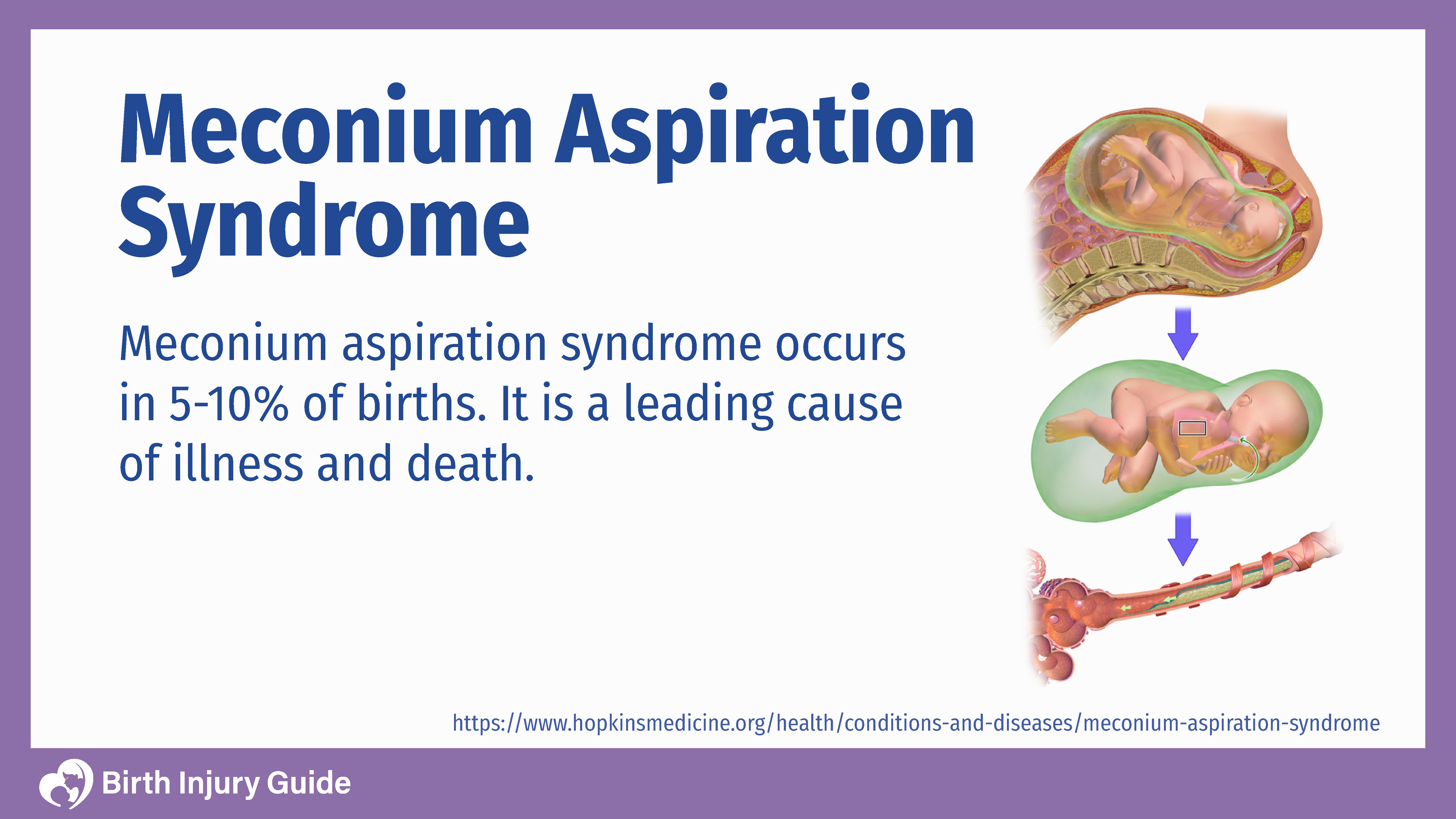
Meconium Aspiration Syndrome
Meconium aspiration syndrome (MAS) is a serious, potentially life-threatening condition that occurs when a newborn breathes in meconium, the sterile fecal material that fills the fetus’s intestines in the womb. This can happen when the newborn has a bowel movement while still in the womb, then breathes in the meconium. When a baby breathes in meconium, they are at risk for respiratory distress, or meconium aspiration syndrome.
Meconium in the amniotic fluid is estimated to occur in 8-25% of all births at or after 34 weeks gestation. Estimates suggest that, historically, around 10% of infants born in meconium stained amniotic fluid developed MAS. Currently, the mortality rate for infants with meconium aspiration syndrome is 1.2% in the United States. It is higher in undeveloped countries.
Although the mortality rates of infants with meconium aspiration syndrome are much better than over the past few decades, infants are still at a heightened risk of lifelong medical complications, especially if medical treatment doesn’t start immediately.
Some important things to know:
- Fetuses do not eat in the womb, but their intestines contain meconium – a sterile fecal material.
- Fetuses may pass meconium in the womb due to stress or as a natural response.
- Stress to the fetus may cause them to gasp, thus inhaling amniotic fluid and meconium.
- Newborns may have a blue tint to their skin and lips, may have trouble breathing and may make a grunting sound when exhaling.
- Along with trouble breathing, meconium aspiration syndrome can be diagnosed by seeing the amniotic fluid after birth (it may be meconium stained).
- Newborns may require oxygen or breathing assistance like a ventilator.
- Most newborns survive, but severe cases can be fatal.

What is Meconium Exactly?
Meconium is a dark green, sterile fecal material that baby’s produce in the intestines while in the womb. The term was coined by Aristotle, who believed that meconium induced infant sleep. The term is based on “meconium arion“, which means “opium like“.
Meconium is usually passed in the first few days after birth, once the newborn starts eating. Meconium is, essentially, the infant’s first bowel movement. It is dark, thick and sticky. It is composed of proteins, fat, epithelial cells, lanugo, mucus and bile. Meconium is 85-95% water. The remaining 5-15% is intestinal secretions and solid elements of amniotic fluid. Solids include proteins and lipids. Meconium begins to develop in the fetal intestines around the 10th week of pregnancy and increases in volume until birth.
Meconium is a sterile product and does not contain bacteria. That is what primarily differentiates it from stool, or feces.
While most baby’s pass meconium after birth, sometimes they pass it before birth or during labor and delivery. In full-term baby’s, this is not usually a severe complication. However, if meconium aspiration syndrome occurs in premature baby’s, it is almost always a sign of a prenatal infection. It is quite uncommon to see meconium stained amniotic fluid prior to 34 weeks.
What is Meconium Aspiration Syndrome?
Meconium aspiration syndrome, or MAS, is medically defined as respiratory distress that occurs with meconium stained amniotic fluid. It is a medical condition that occurs when an infant breathes in a mixture of meconium and amniotic fluid. With MAS, the infant passes meconium while still in the womb. Most often, this is caused by fetal hypoxic stress. In near- or full-term infants, the gastrointestinal (GI) tract is mature and vagal nerve stimulation can cause reactions in the body. Under stress, the rectal sphincter may relax, causing the meconium to pass in the womb or during delivery.
The aspirated meconium and amniotic fluid floods the lungs at the time of delivery, which can block the airways and cause oxygen deprivation. The thicker meconium is, the more dangerous it is if it is breathed into the lungs. When the airways are partially blocked, air only reaches part of the lungs and is not efficiently exhaled back out. Over time, the lung may over-expand or rupture, thus causing a lung collapse. Then, air may accumulate around the chest cavity, which is called a pneumothorax.
When meconium passes into amniotic fluid, it alters the antibacterial activity in the amniotic fluid. This increases the risk of bacterial infection. Meconium is also irritating to the baby’s skin, and cause erythema toxicum. Meconium aspiration syndrome can also cause lung inflammation, which increases the risk of breathing problems and infections. Newborns are also more vulnerable to persistent pulmonary hypertension of the newborn, or PPHN. More details about the dangers of aspirating meconium include:
Airway Obstruction
When meconium is aspirated into the lungs it can block the airways. Airway obstruction increases resistant when exhaling. Gas gets trapped, and the lung may be hyperinflated. As a result, the the lung can rupture and collapse.
Surfactant Dysfunction
Surfactant is a material that coats the airways and lungs and keeps things moving smoothly. The free fatty acids and other elements of meconium can deactivate surfactants and inhibit it from coating properly. This can create problems with the lungs including partial or complete collapse.
Chemical Pneumonitis
Enzyme, bile and fatty acids in meconium are irritating to the airways. As a result, cytokines are released and may lead to chemical pneumonitis. Inflammation can cause difficulty breathing and potentially more serious lung problems.
Persistent Pulmonary Hypertension of the Newborn (PPHN)
Many infants who have meconium aspiration syndrome will develop primary or secondary PPHN. Stress while in the womb causes thickening of the pulmonary vessels, which can disrupt normal breathing and lung function. PPHN is often associated with birth injuries and perinatal distress such as birth asphyxia or respiratory distress.
What Causes Meconium Aspiration Syndrome?
While the mother is still pregnant, the fetus may feel stressed out if there are placenta issues or other stressors. If this occurs, the infant may defecate and in turn breathe in meconium while still in the uterus. The baby is also likely to breathe it in during delivery, which may block the infant’s airways just after delivery.
Risk factors that may contribute to fetal stress include:
- Maternal diabetes
- Maternal high blood pressure
- Preeclampsia
- Oligohydramnios
- Maternal drug use (especially cocaine or tobacco)
- A placenta that ages past the infant’s due date
- Lack of sufficient oxygen to the infant while in utero
- Intrauterine growth restriction (IUGR)
- Postdates pregnancy
What are the Symptoms?
One of the most obvious symptoms of meconium aspiration syndrome is a bluish appearance shortly after birth. This is called cyanosis.
In addition, babies may also have symptoms like:
- Lack of breathing, rapid breathing, or no breathing at all
- Respiratory distress (rapid breathing with chest wall movement and grunting)
- Limpness
- Slow heart rate shortly before birth
- Low blood pressure
- Presence of meconium on the skin, umbilical cord or nail beds (will appear greenish in color)
- Low Apgar score
How is Meconium Aspiration Syndrome Diagnosed?
Diagnosis of MAS is made based on the presence of meconium in the amniotic fluid (may be referred to as meconium stained amniotic fluid), infant breathing problems and abnormal infant chest x-ray. These are what doctors look for to determine if meconium aspiration syndrome is present. Some of the noticeable symptoms that the doctor may look for include:
- Cyanosis
- Grunting
- Nasal flaring
- Tachypnea
- Barrel chest (air trapped in the lungs creates fullness in the chest)
In addition to the obvious symptoms, doctors may also order some tests to look for bacteria or other potential causes of infection. These tests include:
Acid-Base Status
It is important to assess the infant’s acid-base, as perinatal stress can affect these levels. An acid-base test uses cord blood to measure arterial blood gas (ABG). The test measures carbon dioxide and oxygen levels, and provides a baseline. Newborns do not have the blood volume for multiple blood draws, so cord blood is often used to obtain this baseline.
Serum Electrolytes
Within the first 24 hours after delivery, the newborn’s sodium, calcium and potassium levels should be obtained. Newborns with meconium aspiration syndrome often have inappropriate secretion of antidiruetic hormones. Acute renal failure is a complication of perinatal stress, so it is important to monitor kidney and liver function.
Complete Blood Cell Count (CBC)
A CBC is one of the most common blood tests for patients of all ages. As the name suggests, the CBC evaluates overall health by measuring components of blood and detecting a wide variety of disorders. The CBC test is a simple blood collection test that measures:
- Red blood cells (provide oxygen)
- White blood cells (fight infection)
- Hemoglobin (oxygen-carrying protein)
- Hematocrit (proportion of plasma to red blood cells)
- Platelets (helps blood clot properly)
By evaluating these components, doctors can determine if the body is generally healthy, or if there are reasons to be concerned. Abnormal CBCs are often the first indicator of conditions like infections, anemia or leukemia.
Changing Diagnostic Methods
For many years, doctors attempted to reduce the occurrence of meconium aspiration syndrome by suctioning infants immediately after delivery. This practice was universal, but was abandoned more than a decade ago. Research studies show that infants who are “vigorous” at birth do not benefit from suctioning. Instead, the Neonatal Resuscitation Program (NRP) recommends suctioning only for infants who are not vigorous after delivery accompanied by meconium stained amniotic fluid. In 2015, however, the standards changed yet again. Now, it is not recommended to intubate or suction even infants who are not vigorous. Experts believe that there is little evidence to support suctioning.
Now, the NRP recommends that a healthcare provider skilled at endotracheal intubation be present during birth. Initial resuscitation methods should begin first (warmth, clearing secretions with a bulb, dry the infant, stimulate the infant and properly position the infant). IN 2017, the American College of Obstetrics and Gynecology (ACOG) further gave an opinion that vigorous or not, infants with meconium-stained amniotic fluid should not be routinely suctioned.
Important Diagnostic Considerations
Healthcare providers must act quickly and appropriately when diagnosing meconium aspiration syndrome. Periods of hypoxia and acidosis can increase the risk of central nervous system (CNS) damage. Infants who develop long-term complications from hypoxia may suffer a variety of healthcare-related challenges. These situations often result in the parents taking legal action against the doctor or other healthcare providers involved in inadequate or improper resuscitation, diagnosis or treatment of birth injuries. In order to adequately resuscitate a newborn and provide treatment, doctors must be sure they know the cause of distress.
In terms of meconium aspiration syndrome, there are various differential diagnoses, or similar conditions that may cause similar symptoms. Doctors must differentiate between these and ensure they are making the correct diagnosis. Some of the differential diagnoses related to meconium aspiration syndrome include:
- Congenital heart disease
- Congenital diaphragmatic hernia
- Idiopathic pulmonary artery hypertension
- Pneumonia
- Sepsis
- PPHN
- Surfactant deficiency
Start Your FREE Case Review Today
If you or your child is injured as a result of medical negligence, call us to learn more.
Treatment Options
Once doctors identify MAS as the cause of the infant’s distress, they must then consider a variety of factors and options to determine the correct course of treatment. Treatment options sometimes include:
- Suctioning the newborn’s airways
- Providing the newborn with breathing support
- Administering antibiotics and/or surfactants
- Treatment of any underlying disorders
If an infant comes out breathing and crying normally, there is generally no treatment necessary. However, if meconium staining is present or the newborn has breathing problems, then doctors will take action. If the newborn’s mouth and/or airway seems to be blocked by meconium, doctors may start treatment by suctioning it out. In some cases, the baby may need help breathing. In these cases, a breathing tube may be inserted and the baby can breathe with the help of a ventilator. In other cases, a continuous positive airway pressure (CPAP) machine can be used to help newborn’s learn to breathe on their own.
Additional treatments may include antibiotics to treat infections, a radiant warmer to help keep body temperature normal, and surfactants (medications that coat the air sacs and help them stay open).
During treatment, if your newborn requires breathing assistance or other treatment methods, they may be admitted to the neonatal intensive care unit (NICU). This is a special unit in the hospital designed just for baby’s. The doctors and nurses are all specially trained to manage the care of newborns, including premature babies and those with special medical needs. During this time, NICU staff will closely monitor your child. They will monitor for complications like PPHN, pneumothorax or infections.
Some things you can expect during a NICU stay include:
- Minimal handling of the newborn
- Constant blood pressure and heart rate monitoring
- Umbilical artery catheter to monitor blood gasses and pH
- Respiratory therapy including oxygen or ventilation
- Surfactant therapy
- Intravenous feeding via fluid therapy
How is Meconium Aspiration Syndrome a Birth Injury?
One way of preventing meconium aspiration syndrome is for the doctor to monitor the baby’s health and the health of the placenta during pregnancy and just before delivery. If the baby is born with it, it is the responsibility of the medical professionals to get the newborn immediate medical treatment. Failing to diagnose a condition like meconium aspiration syndrome, or failing to treat it in a timely manner, can both be birth injuries caused by medical negligence. Medical negligence occurs when the healthcare provider does not provide the standard level of care (i.e. diagnosis, treatment, etc.) for a particular condition.
In the case of meconium aspiration syndrome or oxygen deprivation, immediate diagnosis and treatment are necessary to prevent more serious complications. If left without oxygen for too long, the baby can suffer brain damage that can cause additional complications such as:
Stroke
A neonatal stroke can occur when the infant’s blood supply to the brain is disrupted. During the first seven days of life, and therefore as related to meconium aspiration syndrome, a stroke is called a perinatal stroke. Around one in 4,000 newborns experience some type of neonatal stroke. Experts believe that many strokes are not detected because infants may not have the same symptoms as adults, or may not be able to communicate them.
Infants that suffer a stroke are at risk for brain damage and conditions like cerebral palsy and long-term disabilities. Strokes that are minor may be treated with neonatal therapeutic hypothermia, which can help reduce brain damage and prevent additional damage.
Hypoxic Ischemic Encephalopathy
Hypoxic Ischemic Encephalopathy, or HIE, occurs when the infant does not get adequate oxygen and blood supply to the brain before, during or shortly after birth. The severity of HIE determines what sort of impact a newborn may have. Mild or moderate cases may result in minimal symptoms and no long term damage. More severe cases, however, may result in significant symptoms, develop long-term complications and even death.
Cerebral Palsy
Cerebral palsy is abnormal development of the brain that causes motor deficiencies, muscle problems and paralysis. It is the most common motor disorder affecting children. Many cases of cerebral palsy are caused by brain damage before, during or shortly after birth. Oxygen deprivation from meconium aspiration syndrome can cause brain damage during this time. There are various types of cerebral palsy, each affecting children differently.
Cerebral palsy can affect children in many ways. Some of the most notable ways that the disorder affects children are:
- Their ability to walk
- Acute and chronic pain
- Speech difficulties
- Hearing loss
- Sleeping disorders
- Neurological disorders
Can MAS be Prevented?
Sometimes infants pass meconium before or during labor as part of their body’s natural response to the stress of delivery. In these cases, it may be unpreventable. Most often, this more natural passage occurs when the baby is term or post-term. Generally, the best way to prevent meconium aspiration syndrome is to prevent fetal stress. Healthcare providers should closely monitor mother and baby for signs of fetal distress.
Prognosis for Meconium Aspiration Syndrome
The prognosis for meconium aspiration syndrome is generally very good. Most baby’s recover without complications if their condition is recognized and treated immediately. Most in the U.S. do not suffer long-term pulmonary (lung) problems. Infants who have meconium aspiration syndrome may be at a higher risk of infections during the first year of life, and are vulnerable to reactive airway disease (RAD) in the first six months of life.
However, severe meconium aspiration syndrome can result in complications, such as have brain damage. In these severe cases, the baby may have lifelong medical problems if left without oxygen for too long. In some rare instances, an infant may develop permanent lung damage and PPHN. Infants with severe illness who require intense breathing assistance are also more likely to have chronic lung disease.
If MAS occurred as a result of stress to the infant, there is also a chance that underlying medical conditions could affect the overall prognosis. Generally, newborns who have meconium aspiration syndrome will be monitored closely for conditions like congenital heart disease or PPHN.
Sources:
- http://www.nlm.nih.gov/medlineplus/ency/article/001596.htm
- http://www.mayoclinic.org/tests-procedures/labor-induction/basics/definition/prc-20019032
- http://www.hopkinschildrens.org/meconium-aspiration-syndrome.aspx
- http://www.ncbi.nlm.nih.gov/pmc/articles/PMC2666857/
- https://emedicine.medscape.com/article/974110-differential



